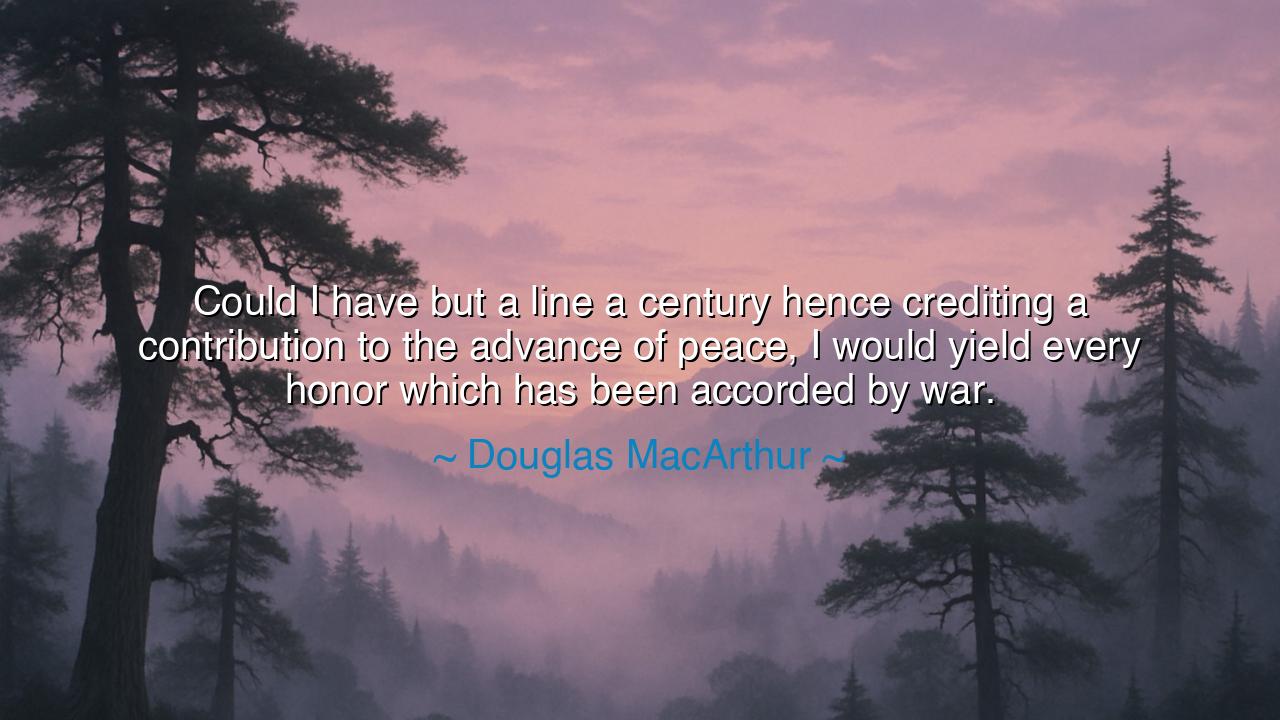
Could I have but a line a century hence crediting a contribution
Could I have but a line a century hence crediting a contribution to the advance of peace, I would yield every honor which has been accorded by war.






“Could I have but a line a century hence crediting a contribution to the advance of peace, I would yield every honor which has been accorded by war.” So spoke General Douglas MacArthur, one of the most decorated soldiers of the modern age, whose life was forged in the crucible of battle yet haunted by the longing for peace. These words, delivered in the twilight of his career, reveal a truth that transcends the drums of victory — that the highest glory of mankind is not conquest, but reconciliation. Though MacArthur stood as a titan of war, leading armies across oceans and continents, he came to understand that the true measure of greatness lies not in the destruction of enemies, but in the preservation of life.
MacArthur uttered these words after the smoke of World War II had cleared, when the ruins of cities still smoldered and the cost of triumph lay heavy upon the human soul. Having commanded the Allied forces in the Pacific and accepted Japan’s surrender aboard the battleship Missouri, he had witnessed both the grandeur and the horror of war. The medals upon his chest, the parades in his honor — these could not ease the sorrow of countless graves. And so he spoke this wish, that history might remember him not as a warrior, but as a builder of peace. The general who had conquered with armies yearned instead to conquer the hearts of men toward understanding.
This confession, clothed in humility, stands as a mirror to the ages. For every generation has known men who sought glory through conflict, yet few have found wisdom in its aftermath. Alexander the Great wept when there were no worlds left to conquer, but he did not live to see the peace that might have followed his victories. Julius Caesar, who subdued nations and reshaped the republic into empire, fell not by foreign sword but by the betrayal of those he called his own. MacArthur, in contrast, saw what these conquerors did not: that every victory written in blood fades, while the victories of peace endure in the hearts of humanity. His words rise as a lament for the folly of war and a prayer that future ages might choose a nobler path.
Indeed, his life itself bore witness to this transformation. After Japan’s surrender, MacArthur became not its destroyer, but its architect of renewal. As Supreme Commander for the Allied Powers, he oversaw the rebuilding of a defeated nation, guiding it toward democracy, education, and peace. The very enemy he once fought, he now sought to uplift. This was his greatest campaign — not to subdue a people, but to restore their humanity. And from the ashes of Hiroshima and Nagasaki rose a Japan that would, in time, become a symbol of resilience and harmony. Thus, his wish was partly fulfilled even in his own lifetime: he became, not merely a general of war, but a steward of peace.
To understand his words fully is to understand the deeper rhythm of history: that violence may build empires, but only peace builds civilizations. The sword can carve out dominion, but it cannot sustain life. Every war, however just, is a confession of failure — a sign that humanity has not yet learned to resolve its struggles through reason and compassion. MacArthur’s lament reminds us that the laurels of war wither quickly, while the seeds of peace bear fruit for generations. To be remembered “a century hence” not for conquest, but for contribution to peace — this is the dream of the wise.
Let us look, too, to others who shared this understanding. Nelson Mandela, imprisoned for decades, emerged not to seek vengeance, but reconciliation. His forgiveness disarmed more hatred than any army could. Mother Teresa, armed with nothing but compassion, changed the lives of millions. These are the warriors of the higher kind — those who wage war not on men, but on suffering and ignorance. They are the ones who fulfill MacArthur’s vision, whose names are inscribed not upon monuments of marble, but upon the living hearts of humanity.
So, my children, take this lesson as your inheritance: seek not honor in conflict, but meaning in peace. Do not crave the fleeting applause of victory, but the quiet immortality of compassion. Build bridges where others build walls; speak calm where others shout rage. For the glory of war dies with the warrior, but the fruits of peace endure beyond the grave. When your own time comes to be remembered, may it be said — as MacArthur wished for himself — that you added one line, one act, one breath, to the advancement of peace.
For in the end, every battlefield fades, every medal tarnishes, and every monument crumbles. But the deeds of peace, like roots beneath the soil, continue to nourish the earth long after memory has dimmed. To labor for peace, then, is to labor for eternity — and to fulfill the highest calling of all humankind.






AAdministratorAdministrator
Welcome, honored guests. Please leave a comment, we will respond soon